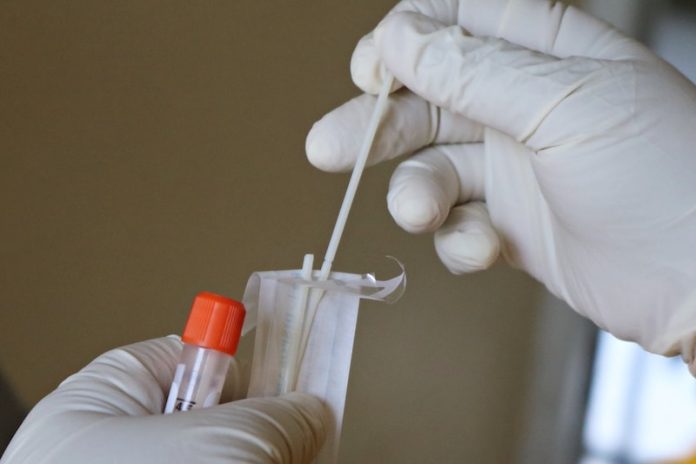
In a new study from the University of Maryland, researchers found genetic testing of saliva samples identifies the SARS-CoV-2 virus more quickly than testing of nasal swabs.
The study is published in Microbiology Spectrum and was conducted by Donald K. Milton et al.
The research was motivated by the problem that early in the pandemic, an urgent need to increase testing was accompanied by a shortage of supplies, notably nasal swabs, which were then the standard method for collecting samples for testing.
The team aimed to identify people with COVID-19 and they conducted weekly tests of saliva samples from healthy community volunteers in May 2020 and continued over the next 2 years.
Of the asymptomatic volunteers who tested positive, the team found that those patients would typically show symptoms a day or 2 later.
In the study, the team used data from a companion study of close contacts of people with confirmed cases of COVID-19.
They collected saliva and mid-turbinate [nasal] swab samples from contacts every 2 or 3 days during their quarantine period.
All samples were tested using real-time reverse transcription polymerase chain reaction [RT-PCR] to detect SARS-CoV-2 and measure how much viral RNA was in the samples.
They then analyzed how these results changed in the days before and after symptom onset.
They found early in the course of infection, saliva was much more sensitive than mid-turbinate nasal swabs.
The findings have implications for improving public acceptance of COVID-19 testing, reducing the cost of mass COVID-19 screening, and improving the safety of healthcare workers who conduct testing.
In the latter case, saliva self-testing avoids the close contact between patient and healthcare worker that nasal swabbing entails and avoids causing patients to cough and sneeze, thereby spreading virus particles as a result of swabbing the sensitive nasal passages, as well as discomfort to patients.
Previous studies have found that real-world, rapid COVID-19 testing produces few false positives results, but that some at-home COVID-19 tests may fail to detect omicron early.
A recent study from George Washington University and published in PLOS One developed a blood test that quickly detects if someone has COVID-19 and predicts how severely the immune system will react to the infection.
The findings could one day lead to a powerful tool to help doctors determine the best treatment plan for people with COVID-19.
Currently, there is no good way to predict how the immune system will respond to the virus that causes COVID-19 or other disease-causing microbes.
The immune response could range from mild symptoms, all the way to critically severe symptoms, which can lead to the intensive care unit or even death.
In the study, the team sequenced whole blood RNA from COVID-19 patients whose symptoms ranged from asymptomatic to severe.
They found visible changes in the cells of people with COVID-19. Their analysis also revealed that COVID-19 severity was associated with an increase in neutrophil activity and a decrease in T-cell activity.
Neutrophils and T-cells, both a type of white blood cell, are part of the body’s immune system and help fight off infections.
In other words, the body’s immune system response, as measured by neutrophil activity, signals that there’s an infection whether caused by a known, novel, or variant pathogen.
The team says this test could prove very valuable during the pandemic, especially as variants continue to spread and doctors need to be confident in identifying the problem and providing effective treatment.
If additional studies prove the test is effective, the researchers plan to seek an emergency use authorization from the U.S. Food and Drug Administration.
If you care about COVID, please read studies about drug duo that may cure COVID-19 together, and green tea provides new hope to treat COVID-19.
For more information about COVID, please see recent studies about the cause of blood clots in people with severe COVID-19, and results showing aspirin and other common anti-inflammatory drugs could help prevent COVID-19 deaths.
Copyright © 2022 Knowridge Science Report. All rights reserved.



